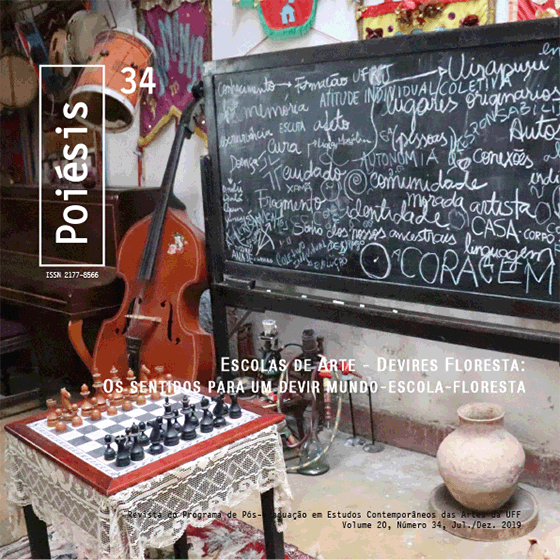Haptic Thinking and Experience through Collective Artistic Research
DOI:
https://doi.org/10.22409/poiesis.v20i34.38294Palavras-chave:
artistic laboratory, corporeality, subjectivity, presenceResumo
This article offers a theoretical reflection and practical proposals from the HeterotRópico artistic laboratory, a nomadic laboratory - where we are investigating dance, performance, physical theater, in conjunction with other diverse social technologies. They bring tools to activate collective practices developed within open creative processes. We will focus on the seminar lab I have proposed at the Masters in Arts Practice and Visual Culture 2018-2019 in Madrid, bringing together an intercultural group of artists and thinkers of around practices of trans-disciplinary arts. Artistic laboratories, in the diverse formats that they are defined today, aim to activate a field of subjectivities and corporeality, explored and co-produced in their uniqueness during the artistic process.
Downloads
Referências
ANTOON, van den Braembussche. Thinking Art: An Introduction to Philosophy of Art. Amsterdam: Springer Science + Business Media B.V, 2009.
BISHOP, Claire. Artificial Hells: Participatory Art and the Politics of Spectatorship. London: Verso, 2012.
DE DUVE, Thierry. Sintoma e intuição. (Entrevista). Novos estud. – CEBRAP, São Pau-lo, n. 79, nov. 2007. Disponível em http://dx.doi.org/10.1590/S0101-33002007000300011
DELEUZE, Gilles. On Spinoza. Lectures by Gilles Deleuze, 2007. Disponível em http://deleuzelectures.blogspot.com.br/2007/02/on-spinoza.html
DEWEY, John. Art as Experience. Translated by Vera Ribeiro. São Paulo: Martins Fontes, 2010.
FEITOSA, Charles. Investigation and Creation: A Dialogue between Vera Mantero and Andre Lepecki. O Percevejo Online, PPGAC/UNRIO, v. 6, n. 1, jan.-jun, 2014. Disponível em http://www.seer.unirio.br/in-dex.php/opercevejoonline/article/view/5070
GUATTARI, Felix. The Three Ecologies. London: The Athlone Press, 2000.
GUMBRECHT, Hans Ulrich. Production of Presence: What Meaning cannot convey. Rio de Janeiro: Contraponto/Editora PUC-Rio, 2004.
LEPECKI, André. Performance and Corpo-reality. Points of Convergence. Lecture by André Lepecki. Jan. 22, 2014. Artmuseum. Disponível em https://artmuseum.pl/ en/doc/video-performans-i-cielesnosc
LEVI-STRAUSS, Claude. The Savage Mind. London: George Weidenfeld and Nicolson Ltd, 1966.
LITTLE, Nina; NELSON, Lisa. Lisa Nelson in Conversation with Nita Little. Movement Research, 2006. Disponível em https:// movementresearch. org/publications/critical-correspondence/lisa-nelson-in-conversation-with-nita-little.
MANNING, Erin; MASSUMI, Brian. Thought in the Act: Passages in the Ecology of Expe-rience. Minneapolis: Minnesota Press, 2014.
OITICICA, Hélio. The Museum is the World. Org. Cesar Oiticica, Rio de Janeiro: Beco do Azougue, 2011.
OITICICA, Hélio. The Senses Pointing Towards a New Transformation. Written for Touch Art Symposium, California State Col-lege, 1969.
PARRA, Natalia Jarra. El Arte Como Ejercicio Experimental de la Libertad. Museo de la Solidaridad Salvador Allende: Coloquio Educar para transformar. Disponível em http://www.autoresdeluruguay.uy/biblioteca/danilo_trelles/lib/exe/fetch.php?media=sf_el_arte_como_ejercicio_experimental _de_la_libertad._natalia_jara_parra.pdf
PEETERS Jeroen. Bodies as Filters: On Re-sistence and Sensoriness in the work of Bo-ris Charmatz, Benoit Lachambre and Meg Stuart. Verwantschappen #2 project at Maasmechelen Cultural Centre, 2004.
PELBART, Peter Pál. The Thought of the Outside, the Outside of Thought. Angelaki Journal of the Theoretical Humanities, v. 5, n. 2, Aug. 2010.
ROLNIK, Suely. Esferas da Insurreição. São Paulo: N-1 edições, 2018.
SPANBERG, Marten. The Doing of Research. http://martenspangberg.se/sites/martenspangberg.org/files/research_06.pdf
STAMER, Peter. What is an Artistic Laboratory. Knowledge in Motion: perspectives of artistic and scientific research in dance. Critical Dance Studies. Bielefeld: Transcript, 2007.
TAYLOR, Diane. The Archive and the Repertoire: Performing Cultural Memory in the Americas. Durham: Duke University Press, 2003.
Downloads
Publicado
Edição
Seção
Licença
Autores(as) que publicam na Revista Poiésis concordam com os seguintes termos:
- Os(as) autores(as) mantêm os direitos autorais e concedem à revista o direito de primeira publicação. O trabalho é automaticamente licenciado sob a Licença Creative Commons Attribution, o que permite o seu compartilhamento desde que seja feito o reconhecimento da autoria e da publicação inicial nesta revista.
- Os(as) autores(as) têm permissão e são estimulados a distribuir online seu trabalho publicado na Revista Poiésis (em repositórios institucionais ou em sua própria página pessoal), uma vez que isso pode gerar interações produtivas, bem como aumentar o impacto e a citação do trabalho publicado (Veja O Efeito do Acesso Livre).


